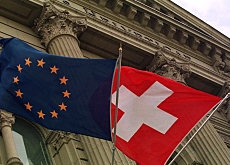Labour accord opens door to new EU members

Switzerland has opened up its labour market to nationals from the European Union's ten newest member states – mostly eastern European countries.
The extension of an accord between Bern and Brussels on the free movement of people came into force on Saturday, six months after the Swiss voted in its favour.
But access to Swiss jobs will be staggered through the use of quotas and the country has the right to impose restrictions on the number of people taking up employment until 2011, although some of these measures may expire earlier.
For a limited period, Swiss-based candidates will have priority over new entrants. Similar restrictions apply to Swiss jobseekers in these member states.
Dominique Boillat, from the Federal Migration Office, told swissinfo that Bern was not expecting a deluge of applications from workers wanting long-term permits, which last up to five years.
A total of 1,700 long-term permits a year will be issued initially, which will rise to 3,000 by 2010.
“We expect short-term permits to continue to be more popular,” he said.
The number of these permits, which last up to 364 days, has been fixed at 15,800 for this year; by 2010, this will increase to 29,000.
They are usually taken up by seasonal workers in sectors like agriculture and catering, a trend that is likely to continue into the future.
Popular
But Switzerland’s popularity as a destination for workers from the EU’s newest member states should not be overestimated.
Boillat predicts that nationals from just three of the ten countries concerned are likely to be drawn here.
“Hungary, the Czech Republic and Poland [in that order] are the three main origin countries – there are already many people [from there] working here,” Boillat said.
He added that the majority of new applicants would probably be skilled manual workers.
Those arriving in Switzerland with a long-term permit will have the right to bring their family with them.
Family members will be allowed to study and work, providing they apply for their own permit.
That Switzerland is unlikely to face a deluge of Polish plumbers and Hungarian dentists is supported by a new report from the European Commission.
EU experience
This took a closer look at the effect of free movement of workers from the EU’s new member states (EU10) on the older ones (EU15) after the EU10 joined the bloc in May 2004.
It found that flows of workers across the EU were “limited” and that the three countries belonging to the EU15 that opened up their labour markets unconditionally to the EU10 experienced higher rates of economic growth.
They were Britain, Ireland and Sweden. In contrast, the 12 older members that decided to impose transitional restrictions to protect national work forces had faced “undesirable side effects”, such as higher levels of undeclared work and bogus self-employment.
The Commission added that its statistics also showed that there were lower-than-expected labour flows from eastern Europe and that there was no surge in worker numbers or welfare expenditure following enlargement.
Vladimir Spidla, the EU Commissioner for Employment, said that countries with transitional arrangements in place should reconsider in the light of the report’s findings.
“This report clearly shows that the movement of free workers has not had disruptive effects on the EU15 labour market – quite the contrary. Individuals, countries and Europe as a whole has benefited from it,” Spidla said.
swissinfo, Faryal Mirza
The Swiss voted in favour of extending the free movement accord on September 25, 2005.
56 per cent were cast in favour.
44 per cent said no to the extension.
Voter turnout was slightly higher than average at 54 per cent.
The first bilateral accord on allowing free movement of people between Switzerland and the European Union came into force in June 2002.
The extension of this accord, which allows the EU’s new member states to participate in the Swiss labour market and vice versa, kicks off on April 1, 2006.
The ten new EU member states joined the bloc in May 2004.
They are: Cyprus, the Czech Republic, Estonia, Hungary, Latvia, Lithuania, Malta, Poland, Slovakia and Slovenia.

In compliance with the JTI standards
More: SWI swissinfo.ch certified by the Journalism Trust Initiative











You can find an overview of ongoing debates with our journalists here . Please join us!
If you want to start a conversation about a topic raised in this article or want to report factual errors, email us at english@swissinfo.ch.